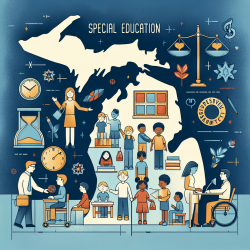Introduction
Adverse Childhood Experiences (ACEs) are known to have profound impacts on mental health, particularly in vulnerable populations such as the Hispanic community. The study "Association Between Adverse Childhood Experiences, Resilience and Mental Health in a Hispanic Community" provides critical insights into how resilience can serve as a protective factor against the mental distress associated with ACEs. This blog will delve into the key findings of the study and offer practical recommendations for practitioners working with children in Hispanic communities.
Understanding ACEs and Their Impact
ACEs encompass various forms of abuse, neglect, and household dysfunction experienced during childhood. Extensive research has demonstrated that individuals exposed to ACEs are at a higher risk of developing mental health issues such as anxiety, depression, and PTSD (Agorastos et al., 2014; Felitti et al., 1998). The study by Dominguez and Brown (2022) highlights that ACEs are positively associated with mental distress in Hispanic communities, making it imperative for practitioners to address these experiences in their therapeutic interventions.
The Role of Resilience
Resilience is defined as the ability to thrive in the face of adversity, utilizing internal resources such as self-esteem, humor, problem-solving skills, and adaptability. The study found that resilience significantly moderates the relationship between ACEs and mental distress. Specifically, individuals with higher resilience levels exhibited lower levels of mental distress despite having experienced ACEs. This finding underscores the importance of fostering resilience in children to mitigate the long-term impacts of ACEs.
Practical Recommendations for Practitioners
Based on the study's findings, practitioners can implement several strategies to enhance resilience and improve mental health outcomes for children exposed to ACEs:
- Integrate Resilience-Building Activities: Incorporate activities that promote self-esteem, problem-solving, and stress management into therapy sessions. Examples include role-playing scenarios, mindfulness exercises, and resilience training programs.
- Provide Psychoeducation: Educate children and their families about the concept of resilience and its importance in overcoming adversity. This can empower them to utilize their internal resources effectively.
- Foster a Supportive Environment: Create a safe and supportive therapeutic environment where children feel comfortable discussing their experiences. Encourage the involvement of trusted adults who can provide continuous support.
- Utilize Evidence-Based Interventions: Implement interventions that have been proven to enhance resilience, such as the 2Gen Thrive program, which focuses on improving caregiver responses to children's emotional and behavioral needs (Woods-Jaeger et al., 2018).
Encouraging Further Research
While the study provides valuable insights, further research is needed to explore the long-term effects of resilience-building interventions and their applicability in different cultural contexts. Practitioners are encouraged to contribute to this growing body of knowledge by conducting longitudinal studies and sharing their findings with the broader community.
Conclusion
The study "Association Between Adverse Childhood Experiences, Resilience and Mental Health in a Hispanic Community" highlights the critical role of resilience in mitigating the mental health impacts of ACEs. By integrating resilience-building strategies into their practice, practitioners can significantly improve outcomes for children in Hispanic communities. To read the original research paper, please follow this link: Association Between Adverse Childhood Experiences, Resilience and Mental Health in a Hispanic Community.










